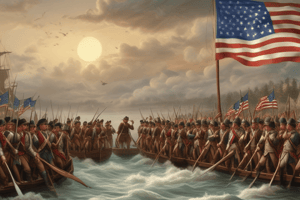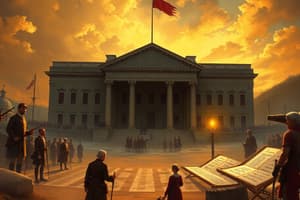Podcast
Questions and Answers
What was a major reason for the establishment of the Articles of Confederation?
What was a major reason for the establishment of the Articles of Confederation?
- To unify the states into a single entity.
- To establish a national tax system.
- To avoid the perceived tyranny of British rule. (correct)
- To create a strong federal government.
Which characteristic was NOT part of the government structure under the Articles of Confederation?
Which characteristic was NOT part of the government structure under the Articles of Confederation?
- Each state had one vote.
- No national judiciary.
- Unicameral legislature.
- Executive branch. (correct)
Which issue arose due to the Articles of Confederation’s inability to regulate commerce?
Which issue arose due to the Articles of Confederation’s inability to regulate commerce?
- Creation of a national currency.
- Increased federal authority over states.
- High taxation by the federal government.
- Economic disputes between states. (correct)
What was a key outcome of the Constitutional Convention?
What was a key outcome of the Constitutional Convention?
Which principle ensures that governmental power is divided among different branches?
Which principle ensures that governmental power is divided among different branches?
Federalists and Anti-Federalists primarily disagreed on which issue?
Federalists and Anti-Federalists primarily disagreed on which issue?
Which term describes the practice established by Washington that limited presidents to two terms?
Which term describes the practice established by Washington that limited presidents to two terms?
Which statement accurately reflects the views of Alexander Hamilton?
Which statement accurately reflects the views of Alexander Hamilton?
Flashcards
Articles of Confederation
Articles of Confederation
A weak central government established after the American Revolution, emphasizing state sovereignty.
Unicameral Legislature
Unicameral Legislature
A one-house legislature, a feature of the Articles of Confederation.
State vs. Federal Power (Articles)
State vs. Federal Power (Articles)
States held significant power, hindering the central government's ability to effectively regulate and unite the nation.
Constitutional Convention
Constitutional Convention
Signup and view all the flashcards
Separation of Powers
Separation of Powers
Signup and view all the flashcards
Federalists
Federalists
Signup and view all the flashcards
Whiskey Rebellion
Whiskey Rebellion
Signup and view all the flashcards
Checks and Balances
Checks and Balances
Signup and view all the flashcards
Study Notes
Articles of Confederation: Historical Context
- Established a weak central government after the American Revolution.
- Designed to avoid the perceived tyranny of the British monarchy.
- Reflects a strong desire for state sovereignty among founding fathers.
- Created a "league of friendship" among states.
Articles of Confederation: Government Structure
- Unicameral legislature (one house).
- No executive branch.
- No national judiciary.
- Each state had one vote in the Congress.
- Congress lacked power to tax directly.
- Amendment required unanimous consent of all states.
State vs. Federal Power under Articles of Confederation
- States retained significant power.
- Central government lacked the authority to enforce laws effectively.
- Inability to regulate commerce among states led to economic issues.
- Frequent disputes between states hindered national unity.
Writing the Constitution
- Growing dissatisfaction with the Articles of Confederation led to the Constitutional Convention.
- Delegates from various states met to address the shortcomings.
- Debates focused on power distribution between states and central government.
- Compromises were reached on issues such as representation and slavery.
Constitutional Principles
- Separation of powers: Dividing governmental power among three branches (legislative, executive, judicial).
- Checks and balances: Each branch has the ability to limit the power of the others.
- Popular sovereignty: Government derives its power from the consent of the governed.
- Federalism: Division of power between federal and state governments.
- Judicial review: Power of the courts to review laws for constitutionality.
Federalists vs. Anti-Federalists
- Federalists supported strong central government and the proposed Constitution.
- Anti-Federalists opposed a strong central government and feared concentrated power.
- Debates centered on the balance of liberty and order.
- Federalists promoted a unified nation.
- Anti-Federalists prioritized states' rights and individual freedoms.
Washington's Presidency
- First President of the United States.
- Set precedents for future presidents, like the two-term limit.
- Established a cabinet of advisors.
- Faced challenges like domestic unrest (Whiskey Rebellion).
- Promoted neutrality in foreign affairs.
Jefferson and Hamilton
- Key figures in early American politics with contrasting views.
- Hamilton: Favored a strong central government, national bank, and industry.
- Jefferson focused on states' rights, agrarianism, and a limited central government.
- Their differing views led to the development of the first political parties.
- Debate influenced the development of economic policy.
Studying That Suits You
Use AI to generate personalized quizzes and flashcards to suit your learning preferences.



